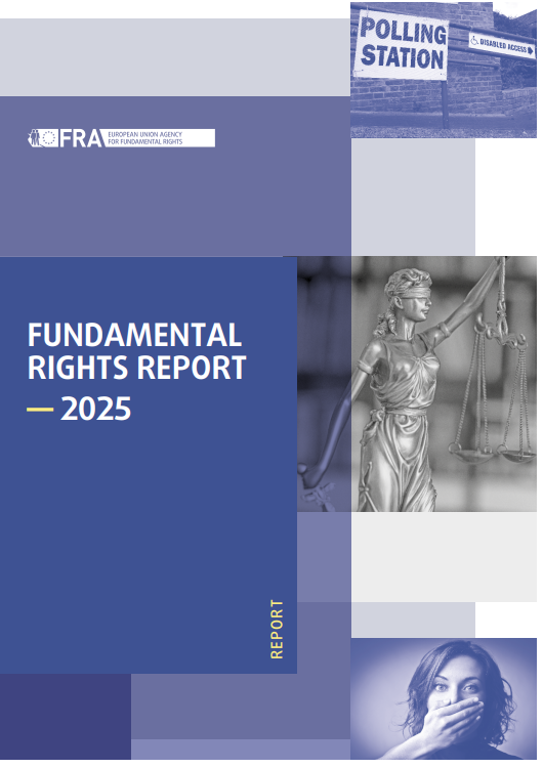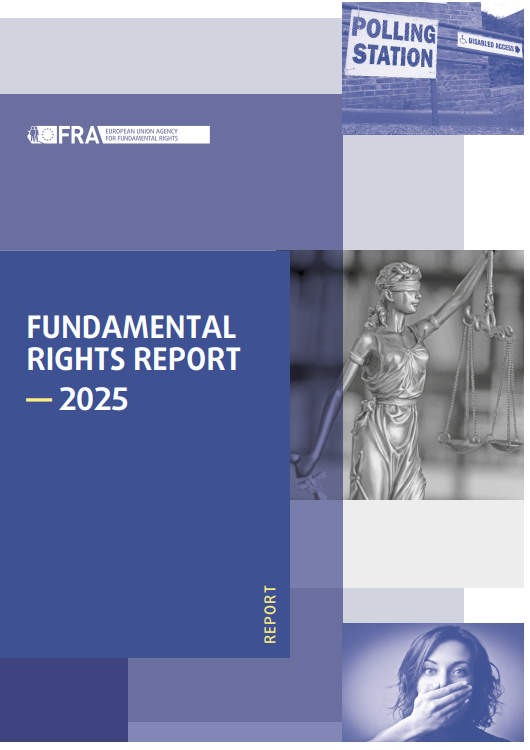FRA warns of persistent discrimination against Roma in the European Union [editar]

In its Annual Report on Fundamental Rights 2025, the FRA warns that Roma continue to face serious rights violations across the EU. Despite the initiatives and strategies in place, real progress on equality, inclusion and participation is limited.
Socio-economic conditions, following several crises, geopolitical changes and international conflicts are endangering fundamental rights in the EU. ‘Difficult times for fundamental rights’, in the words of its Director, Sirpa Rautio. ‘We need to act decisively to ensure that fundamental rights remain at the heart of all EU policies and actions.’The European Union Agency for Fundamental Rights (FRA) 2025 report released today points to a continuing pattern of racism and discrimination that significantly affects the Roma population, as well as other groups: Jews, Muslims, black people, migrants and LGBTIQ people.
The report highlights that Roma citizens continue to be subjected to systematic racism, structural discrimination and hate crimes. The presence of offensive and stigmatising content on social media also contributes to reinforcing their social exclusion and fuels worrying hate speech.
No political representation of minorities in European institutions
Despite constituting an estimated 6 million people in the EU, there are currently no Roma representatives in the newly elected European Parliament; whereas in the past there have been at least a small number of representatives. Moreover, according to the Report, Roma women face additional obstacles to accessing decision-making positions, and many Roma candidates in national elections face intimidation, exclusion from the lists or documentary problems that prevent them from participating on equal terms.
This situation is part of a general stagnation in the level of minority representation in the European Parliament and other European bodies. The proportion of MEPs who identify themselves as part of a racial or ethnic minority was around 3.3% in 2014 and 4.5% in 2019. Of current MEPs, only 3.2% belong to national minorities. While this represents an increase from 2.8% in the previous legislature, the current presence of national minorities in the European Parliament is not representative of the actual proportion of minorities in the EU (6.7%).
Lack of effective implementation of fundamental rights.
The report underlines that, despite the existence of EU anti-discrimination legislation, its implementation by Member States remains insufficient. The lack of tangible progress in improving the living conditions of Roma is evidence of persistent non-compliance with the commitments made.
It is in this context of discrimination and racism that a better and greater application of existing laws to protect the most vulnerable people is justified, as well as the effective implementation of the strategies designed in the different countries.
The FRA announces that it is carrying out a new data collection on racism and hate crimes experienced by the Roma population, the results of which will be made public this year and will be used to assess compliance with the EU Framework for Roma Equality, Inclusion and Participation 2020-2030.
Institutional racism
FRA reports that racism is not limited to social interactions. Institutionalised racist attitudes can also be embedded in public services and government policies.
Racism exists in public services, such as state security forces, which are designed to protect the communities they serve. In 2024, the FRA published the first EU-wide report on racism in policing ‘Addressing racism in policing’. This report demonstrates that racism in policing remains a problem and is widespread across the EU. Racism in policing has far-reaching effects, fostering social exclusion and undermining confidence in police forces.
Digitalisation and artificial intelligence
The FRA report denounces the risks posed by Artificial Intelligence and how its use can negatively affect fundamental rights. It considers that technology and algorithms designed to detect and stop the spread of hate speech can be biased and lead to discrimination through over- or under-deletion of content, which can disadvantage certain groups because of their ethnicity.
Call for action
FRA Director Sirpa Rautio says: "Fundamental rights in Europe face growing and increasingly serious challenges. Geopolitical tensions, growing intolerance and threats to electoral integrity are testing the resilience of our democratic institutions. At the same time, calls for simplification and deregulation risk undermining vital safeguards that protect people's rights. This is a wake-up call for the EU and its Member States to reaffirm their commitment: we need to act decisively to ensure that fundamental rights remain at the heart of all EU policies and actions."
FRA urgently calls on the European institutions and Member States to:
- Strengthen the effective implementation of anti-discrimination legislation.
- Establish independent monitoring mechanisms.
- Collect and use robust and regular data on equality and discrimination.


